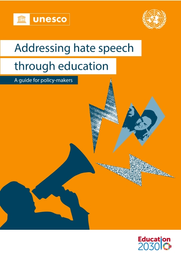العودة

How can countries worldwide tap into the power of education to counter hate speech online and offline?
المنشورات
2023 - 04 - 17
A New Comprehensive Guide to Combating Hate Speech Through Education

UNESCO and the United Nations Office of the Special Adviser on the Prevention of Genocide (OSAPG) have jointly developed the first guide providing policy-makers and teachers with practical recommendations for strengthening education systems to counter hate speech. The guide offers a range of ideas, including: equipping teachers to become agents of change, promoting civic education and critical thinking, using education to promote respect for diversity and human rights, and fostering intercultural dialogue and mutual understanding.
Educating people on the difference between (rather harmless) insults and hate speech can help protect their freedom of expression while also encouraging respect and understanding. Learning how to draw the line between the two can help individuals recognize the consequences of their words and actions on others and prevent the spread of hateful narratives. Educational institutions should not restrict learners' freedom of speech, but instead foster an environment where respect and understanding are prioritized, allowing learners to express their opinions without the spread of hateful narratives.
What are the ways to spot and counter hateful narratives within curricula?
Learners should be encouraged to discuss and examine one-sided narratives that fuel hate speech and justify exclusion which are prevalent in many subject areas and educational programmes. It is important to recognise the damaging effects of these narratives and to take action to counter them.
Facilitating difficult conversations about discrimination, breaking down stereotypes and prejudice, and recognising the trauma and stigma caused by violence are all necessary components of teaching and learning about social inequality and power dynamics. Revising and reviewing curricula and educational materials can help to make learners more aware of the various types of discrimination that still exist in the world today, as well as the mechanisms that lead to violence in societies.
How can teachers create an alternative sense of belonging?
In order to create an effective learning environment, it is critical to prioritize establishing a safe, nurturing, inclusive, and collaborative classroom atmosphere. Unfortunately, hatred can be attractive to some, as it can provide a false sense of purpose and connection. To counter this, it is essential to invest in fostering a sense of community in and out of school settings, as well as including diverse perspectives in the educational process.
Programmes that promote Global Citizenship Education (GCED) and encourage collaboration, as well as inclusive and culturally-sensitive practices can assist in building the required understanding and competencies to accept diversity and engage respectfully in a multicultural society. Social and Emotional Learning (SEL) provides teachers with practical methods to help create a sense of belonging amongst learners. Through using case studies and real-life examples to debate contentious topics and different perspectives, learners can learn to manage stress and negative emotions, recognise their strengths and weaknesses, and resolve disputes.
For more information:
أحدث المنشورات
القائمة الكاملةاليونسكو
لمحة حول الندوة الإلكترونية رقم 4 الخاصّة بمرجع ممارسات التعليم والتعلّم الواعدة -تربية 21
نظم مكتب اليونسكو الإقليمي متعدّد القطاعات في بيروت سلسلة من الندوات عبر الإنترنت، كجزء من مشروع تربية 21 الخاصّ بمرجع ممارسات التعليم والتعلم الواعدة ، الذي يهدف إلى تحسين جودة التعليم في جميع أنحاء العالم العربي. غطت السلسلة، التي استمرت من أيلول/سبتمبر إلى كانون الأول/ديسمبر 2023، مجموعة من المواضيع المهمة، بما في ذلك جودة التعليم والتعلم (6 أيلول/سبتمبر)، وتعزيز معرفة اللغة العربية (7 أيلول/سبتمبر)، والتحول الرقمي للتعليم (24 تشرين الأول/أكتوبر)، والتعليم من أجل التنمية المستدامة/ تخضير التعليم (28 تشرين الثاني/نوفمبر) والتطوير المهني للمعلمين (12 كانون الأول/ديسمبر).
اليونسكو
Insights from Tarbiyah21 Repository webinar series
The UNESCO Multisectoral Regional Office in Beirut recently hosted a series of webinars, as part of the Tarbiyah21 Repository of Teaching and Learning Practices’ project, aimed at improving education quality across the Arab world. The series, which ran from September to December 2023, covered a range of critical topics, including Quality Teaching and Learning (6 September), Promoting Arabic Literacy (7 September), Digital Transformation of Education (24 October), Education for Sustainable Development/Greening Education (28 November) and Teacher Professional Development (12 December).
اليونسكو
Global report on teachers: addressing teacher shortages; highlights
UNESCO and the Teacher Task Force presented the highlights of the first global report on teachers on 8 November 2023 during UNESCO’s General Conference.
اليونسكو
UNESCO- Iraq's Ministry of Education transforming vocational education
UNESCO's Technical and Vocational Education and Training (TVET) programme, in collaboration with Iraq's Ministry of Education and supported generously by the EU, has played a pivotal role in enhancing vocational education and employability in the country. Focusing on five “Pilot” schools in Erbil, Mosul, Baghdad, Karbala, and Basra, the initiative aims to transform these institutions into Centers of Vocational Excellence.